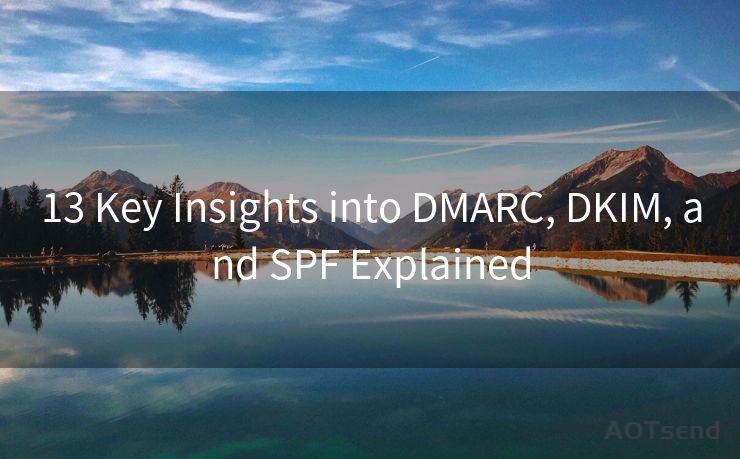13 Key Insights into DMARC, DKIM, and SPF Explained




When it comes to email security, DMARC, DKIM, and SPF are crucial protocols that enhance the protection of your emails and prevent spoofing and phishing attacks. Let's dive into the 13 key insights that explain these protocols and their importance.
1. Understanding DMARC (Domain-based Message Authentication, Reporting, and Conformance)
DMARC is an email authentication protocol that helps domain owners protect their domains from email spoofing. It builds upon the existing SPF and DKIM protocols, adding a reporting mechanism and a policy for handling unauthenticated emails.

2. DMARC's Role in Fighting Email Spoofing
Email spoofing is a common tactic used in phishing attacks. By implementing DMARC, domain owners can specify how email receivers should handle unauthenticated emails, reducing the chances of spoofed emails reaching users' inboxes.
3. DKIM (DomainKeys Identified Mail) Explained
DKIM is an email authentication technique that uses cryptographic signatures to verify the sender's domain and the integrity of the email content. It ensures that the email hasn't been tampered with during transit.
4. How DKIM Works
When an email is sent, the sending server attaches a DKIM signature to the email header. This signature is verified by the receiving server, confirming the email's authenticity and integrity.
5. SPF (Sender Policy Framework) Basics
SPF is an email validation system designed to prevent email spoofing by specifying which IP addresses are authorized to send emails from a particular domain.
6. Implementing SPF for Email Security
By publishing an SPF record in the DNS, domain owners can define which servers or IP addresses are allowed to send emails on behalf of their domain. This helps in identifying and blocking spoofed emails.
7. The Importance of Aligning DMARC, DKIM, and SPF
For optimal email security, it's crucial to align these three protocols. When properly configured, they provide a robust defense against email spoofing and phishing attacks.
🔔🔔🔔
【AOTsend Email API】:AOTsend is a Managed Email Service for sending transactional emails. Support Email Types: reminders, authentication, confirmations, notifications, verification codes, invoices, password resets, account activations, billing statements, two-factor authentication (2FA), and one-time passwords (OTP) emails, etc. $0.28 per 1000 Emails. 99% Delivery, 98% Inbox Rate.
You might be interested in:
Why did we start the AOTsend project, Brand Story?
What is a Managed Email API, How it Works?
Best 25+ Email Marketing Platforms (Authority,Keywords&Traffic Comparison)
Best 24+ Email Marketing Service (Price, Pros&Cons Comparison)
Email APIs vs SMTP: How they Works, Any Difference?
8. Benefits of DMARC, DKIM, and SPF Alignment
Aligning these protocols offers several benefits, including improved email deliverability, enhanced brand reputation, and reduced chances of being blacklisted due to spoofing activities.
9. Common Challenges in Implementing These Protocols
While implementing DMARC, DKIM, and SPF can significantly enhance email security, there are challenges, such as complex configuration requirements and potential compatibility issues with certain email systems.
10. Best Practices for DMARC, DKIM, and SPF Implementation
To ensure successful implementation, follow best practices like regularly updating your DNS records, monitoring and analyzing reports, and gradually moving towards a stricter DMARC policy.
11. The Role of DMARC, DKIM, and SPF in a Layered Security Approach
These protocols form a crucial part of a layered security approach, complementing other security measures like firewalls, antivirus software, and multi-factor authentication.
12. Staying Up to Date with Evolving Email Security Threats
As email security threats evolve, it's essential to stay updated on the latest trends and vulnerabilities. Regularly reviewing and updating your email security measures, including DMARC, DKIM, and SPF configurations, is crucial.
13. Conclusion: The Value of DMARC, DKIM, and SPF in Email Security
In conclusion, DMARC, DKIM, and SPF are vital components of email security, providing robust protection against spoofing and phishing attacks. By understanding and implementing these protocols effectively, organizations can significantly enhance their email security posture.




Scan the QR code to access on your mobile device.
Copyright notice: This article is published by AotSend. Reproduction requires attribution.
Article Link:https://www.mailwot.com/p1466.html



